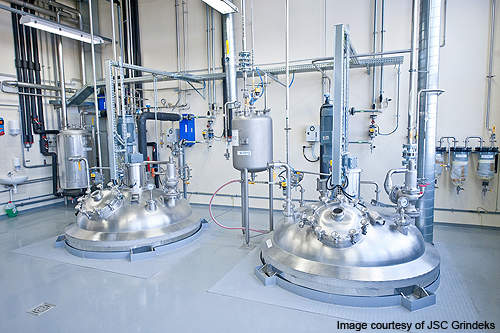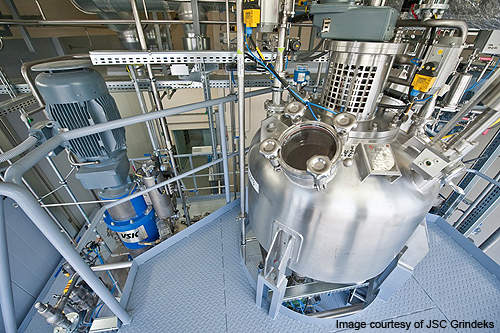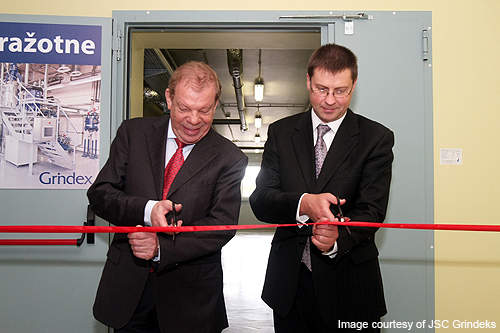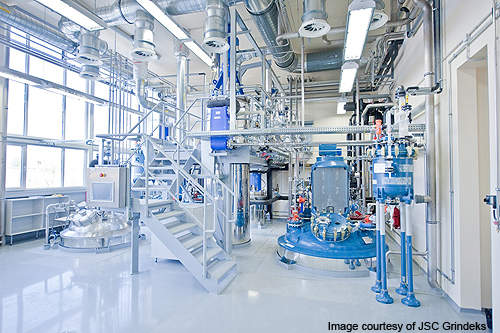Latvia-based Grindeks opened a new active pharmaceutical ingredient (API) manufacturing unit in Riga in June 2011.
The new unit produces ursodeoxycholic acid (UDCA), which will be used in the formulation of final dosage forms for the treatment of gallstone and hepatic diseases. The API is also being tested for indications such as cancer.
Addition of the UDCA to Grindeks’ portfolio is expected to double its API business. When fully operational, the Grindeks unit is expected to boost the UDCA sales to $14m per annum.
Grindeks is one of the leading pharmaceutical companies in the Baltic region.
The company has four subsidiaries in Russia, Latvia and Estonia and has representatives in ten other countries.
Its key areas of operations are research and development, manufacturing and marketing of APIs, original products and generics.
Grindeks produces 16 different APIs produced through multistage synthesis, and about 100 final dosage formulations. The main areas of activity are anti-cancer, heart and cardiovascular and CNS medication.
The products are exported to about 50 countries including the Baltic States, the Netherlands, Germany, Russia, Australia and Japan.
The UDCA project is part of the Grindeks’ vertical integration strategy to develop and manufacture the APIs independently, and produce and market the finished products. The company aims to develop the final dosage form of UDCA and release it in the market by 2014.
Grindeks’ UCDA facility
The API facility is designed to meet the global standards of the pharmaceutical industry. It has a total floor area of 2,300m².
The unit has been certified to meet the ISO standards and the international GMP guidelines. The project created 35 new jobs at the UDCA unit.
The unit has powerful and modern technological devices to facilitate safe, convenient and efficient production. An automated management system is installed in the facility to regulate the production processes.
The energy-efficient system controls the microclimate in the work areas and facility premises, and provides working support to the engineering systems. It is expected to save significant amounts of energy.
Ursodeoxycholic acid production
The output from the UDCA unit will be supplied to Marenis Pharma, a German pharmaceutical company.
Grindeks made the initial pilot series delivery of UDCA production to Marenis Pharma in January 2008. A multistage, long-term supply agreement was signed between the two companies in 2009 after the quality assessment was found to be positive.
The UDCA facility will help Grindeks to maintain a continuous supply to Marenis Pharma.
The company will supply about 30t of UDCA ingredients to Marenis Pharma in 2011. Grindeks expects to win 15% of the UDCA global market of 400t by 2014.
Manufacturing in the Latvian plant
Production of UDCA is considered to be a time consuming and complicated process.
It involves several stages such as refinement, hydration, crystallisation, replacement and other chemical transformation.
The advanced plant technologies and experienced professional specialists are expected to help in introduction of high value-added products.
Construction / contractors
Construction of the UDCA unit was started in October 2009. Kvadrs, a Latvian construction company, was responsible for unit construction.
The company also hired several subcontractors. Czech Republic-based GM Project was the project manager during the facility construction.
Financing the project
Construction of the unit required an investment of LVL6.34m ($13m). The project had received funding of LVL2.8m ($5.6m) from the European Regional Development Fund (ERDF) towards the infrastructure.
Swedbank provided a long-term loan of LVL4.35m ($8.7m) to Grindeks and also bank guarantee to ERDF.
Grindeks’ facilities in Riga
Grindeks was founded in October 1991 with its headquarters in Riga, Latvia. The company opened a GLP certified scale-up laboratory in Riga in June 2007. It is one of the most modern synthesis process research laboratories in Europe.
In January 2009, Grindeks opened a new final dosage forms plant in Riga with an investment of LVL9.1m ($16m). In April 2011, a new anti-cancer final dosage forms manufacturing unit was also opened at the same place. It is also planning to establish an injectable (parenteral) drugs facility in the free port of Riga.






